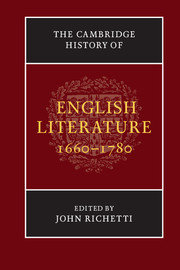Book contents
- Frontmatter
- Introduction
- PART I LITERARY PRODUCTION AND DISSEMINATION: CHANGING AUDIENCES AND EMERGING MEDIA
- PART II LITERARY GENRES: ADAPTATION AND REFORMATION
- 5 Restoration and early eighteenth-century drama
- 6 Dryden and the poetic career
- 7 Political, satirical, didactic and lyric poetry (I): from the Restoration to the death of Pope
- 8 Eighteenth-century women poets
- 9 Systems satire: Swift.com
- 10 Persistence, adaptations and transformations in pastoral and Georgic poetry
- 11 Political, satirical, didactic and lyric poetry (II): after Pope
- 12 Drama and theatre in the mid and later eighteenth century
- 13 Scottish poetry and regional literary expression
- PART III LITERATURE AND INTELLECTUAL LIFE: THE PRODUCTION AND TRANSMISSION OF CULTURE
- PART IV LITERATURE AND SOCIAL AND INSTITUTIONAL CHANGE
- PART V LITERARY GENRES: TRANSFORMATION AND NEW FORMS OF EXPRESSIVENESS
- PART VI CONCLUSION
- Chronology
- Bibliographies
- Index
- References
12 - Drama and theatre in the mid and later eighteenth century
from PART II - LITERARY GENRES: ADAPTATION AND REFORMATION
Published online by Cambridge University Press: 28 March 2008
- Frontmatter
- Introduction
- PART I LITERARY PRODUCTION AND DISSEMINATION: CHANGING AUDIENCES AND EMERGING MEDIA
- PART II LITERARY GENRES: ADAPTATION AND REFORMATION
- 5 Restoration and early eighteenth-century drama
- 6 Dryden and the poetic career
- 7 Political, satirical, didactic and lyric poetry (I): from the Restoration to the death of Pope
- 8 Eighteenth-century women poets
- 9 Systems satire: Swift.com
- 10 Persistence, adaptations and transformations in pastoral and Georgic poetry
- 11 Political, satirical, didactic and lyric poetry (II): after Pope
- 12 Drama and theatre in the mid and later eighteenth century
- 13 Scottish poetry and regional literary expression
- PART III LITERATURE AND INTELLECTUAL LIFE: THE PRODUCTION AND TRANSMISSION OF CULTURE
- PART IV LITERATURE AND SOCIAL AND INSTITUTIONAL CHANGE
- PART V LITERARY GENRES: TRANSFORMATION AND NEW FORMS OF EXPRESSIVENESS
- PART VI CONCLUSION
- Chronology
- Bibliographies
- Index
- References
Summary
Almost all ‘histories’ of eighteenth-century English drama have focussed on the new plays. This is a natural and in some ways defensible way to proceed, but ‘new plays’ are a product of the theatre system inwhich they are produced, and any attempt to treat them in glorious isolation must inevitably produce fallacious and misleading results. New plays did not beget one another, and neither were they necessarily a major influence on their immediate successors. Between 1730 and 1790 something like 85 per cent of the mainpiece performances in London were of old plays – many of them several decades old or more. New plays tended to be written as vehicles for the principal performers, and consequently the parts those performers took in stock plays had a major influence on the new works written for them. Innovation was rarely a desideratum; neither was literary merit a prime concern. Whatever critics of the time had to say, plays served primarily as popular entertainment.
To comprehend eighteenth-century drama as it was written and experienced in its own day, one must start by realising three things. First, only a few of the plays have ever received attention from twentieth-century critics, and most of those plays are atypical. Second, a performance did not consist of one comedy or tragedy viewed in decorous silence. People came, wandered about and left; those who stayed bought refreshments and talked. Many of the mainpieces were not comedy or tragedy but musical. Most nights included an afterpiece as well as a mainpiece, and a great many nights featured interpolated entertainments of various sorts – song, dance, spectacle.
- Type
- Chapter
- Information
- The Cambridge History of English Literature, 1660–1780 , pp. 316 - 339Publisher: Cambridge University PressPrint publication year: 2005
References
- 2
- Cited by

